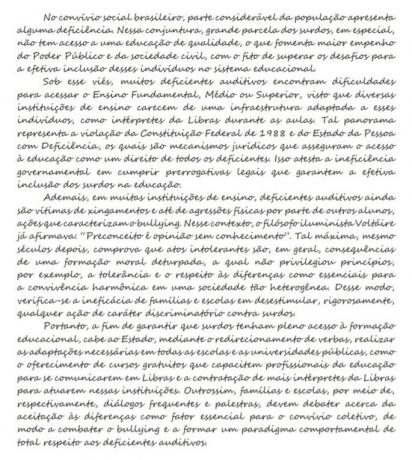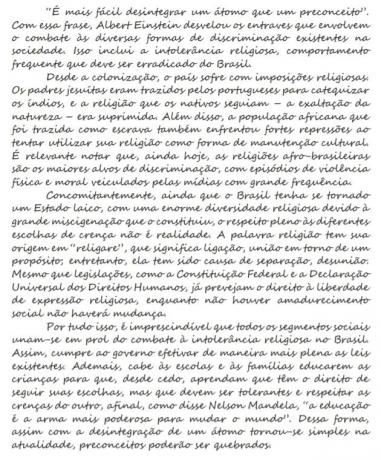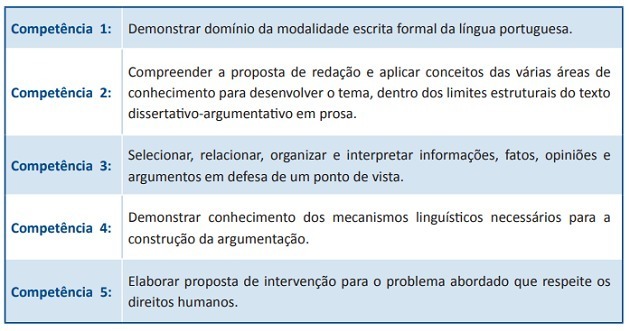Enem candidates know how difficult it is to get the so-desired 1000 score (less than 1% of participants achieve this feat). See below for examples and analysis of essays that had the highest score.
Writings note 1000 of Enem 2019
Theme: Democratization of access to cinema in Brazil
Author: Gabriel Melo Caldas Nogueira
For the Scottish philosopher David Hume, the main characteristic that distinguishes humans from other animals is the power of your thinking, ability that allows you to see what has never been seen and hear what has never been heard. From this perspective, it is seen that cinema represents the ability to transpose the ideas and thoughts present in the screen to the screen. people's intellect, in order to enable the creation of new universes and, precisely because of this cognitive potential, it is very relevant. It is prudent to point out, in light of this, that cinematographic art must be democratized, especially in Brazil – a country rich in cultural expressions that can dialogue with this artistic model - for reasons that concern both society and laws.
First, it is worth emphasizing that cinema dialogues with an elementary social need and, consequently, cannot be left in the background. To understand this logic, one can mention the renowned Dutch historian Johan Huizinga, who in the book “Homo Ludens”, confirms the constant human search for playful pleasure, as it promotes a beneficial well-being. It is exactly at this juncture that the cinematographic phenomenon is inserted, since it, by enabling the interaction of several individuals in the contemplation of the show, makes the audience participate in the stories, in order to share experiences and experiences - which represents the playful factor mentioned by the thinker. Therefore, the commendable benefactor element of this artistic creation is noticeable, capable of guaranteeing the cohesion of the community.
Secondly, it is opportune to comment that the aforementioned cinema scenario refers to what the country's legal framework defends. This is because Article 215 of the Federal Constitution is clear in characterizing cultural goods as a right for all, conceived with absolute priority on the part of the State. However, it is disheartening to note that this guideline does not show signs of full implementation and, to prove this, it is enough to analyze the various surveys of the Institute of Historic and National Artistic (IPHAN) that demonstrate the lamentable irregular distribution of artistic practices – among them, the cinema –, since they are restricted to a few municipalities Brazilians. One can see, then, the danger of the rule presented ending up in disuse, under penalty of confirming what Dante Alighiere proposed in “The Divine Comedy”: “Laws exist, but who applies them?”. This scenario, certainly, is configured as a disaggregating one and cannot be neglected.
Finally, paths must be elucidated to democratize access to cinema in Brazil, taking into account the social and legislative issues addressed. Therefore, it is up to the Federal Government - the body responsible for the well-being and leisure of the population - to draw up a national plan to encourage the practice cinematographic, in order to institute actions such as the creation of national cultural weeks, as well as the development of artistic activities public services. This can be done through an association between city halls, governors and federal sectors - since the phenomenon involves all these areas administrative -, which must carry out periodic events, anchored by actors and directors, aimed at showing free films to the community civil. This project must adapt to the reality of each city to be effective. In this way, cinema can be, finally, democratized, which will confirm what article 215 of the Constitution determines. Thus, fortunately, citizens will be able to enjoy the benefits resulting from this magnifying artistic action.
Theme: Democratization of access to cinema in Brazil
Author: Isabella de Oliveira Cardoso
In a fictional way, the film “Cine Holiúdi” portrays the positive impact of cinema on the daily lives of cities, given its ability to promote leisure, socialization and culture. However, in reality, such benefits do not reach the entire Brazilian population, given the elitization of cinematographic media and the lack of adequate infrastructure in existing cinemas. Therefore, it is urgent to analyze and resolve these barriers to democratize access to cinema in Brazil.
At first, it is fair to point out that the elitization of cinematographic media contributes to many Brazilians being prevented from attending movie theaters. That said, according to the English philosopher Nick Couldry in his work “Why does the voice matter?”, society Today's neoliberal tends to silence the less favored groups, depriving them of the means of Communication. In addition, there is no doubt that the location of movie theaters in more upscale areas and the high value of tickets configure an attempt to exclude and silence peripheral groups, as discussed by Nick Couldry. In this perspective, few individuals enjoy the right to leisure and culture promoted by cinematography, which is provided for in the Constitution and must be guaranteed to all by the State.
Furthermore, it is worth postulating that the lack of adequate infrastructure for all citizens also hinders wide access to movie theaters in the country. While accessibility is a right guaranteed by the Magna Carta and cinemas have reserved spaces for wheelchair users, there is no LIBRAS interpreters on the screens and the configuration of the rooms - based on stairs - does not help the displacement of elderly and needy people specials. In light of this perspective, it is essential that there is greater investment in infrastructure so that all Brazilians are included in film environments.
Finally, given the challenges mentioned above, joint action by the State and society is necessary to mitigate them. In this context, it is up to the government, in the figure of the Public Ministry, in partnership with the national media, to develop educational campaigns - through virtual booklets and short films to be aired on social media - in order to guide the population and film companies to value the cinematographic environment and expand the accessibility of rooms. In turn, companies must collaborate with the democratization of access to cinema by charging more affordable prices and by building adapted theaters. Once this is done, Brazil will be able to guarantee the benefits of cinema to everyone, as reported in the film “Cine Holiúdi”.
Writing note 1000 of Enem 2018
Theme: Manipulation of user behavior by controlling data on the internet
Author: André Bahia Pereira

Writing note 1000 of Enem 2017
Theme: Challenges for the educational training of deaf people in Brazil
Author: Lorena Magalhães Macedo

Writing note 1000 of Enem 2016
Theme: Ways to fight religious intolerance in Brazil
Author: Tamyres dos Santos Vieira

What do note 1000 newsrooms have in common?
The maximum score indicates that the text meets all the competences provided for in the reference matrix for writing, which are as follows:

In the examples above, the participants got the maximum score because:
1. presented formal writing
The participants' texts are in accordance with the cultured norm (competence 1). All grammatical rules were respected.
In the examples given above, very good syntactic structures were presented, and correct concordance, rulership, punctuation and spelling were presented. There were only small deviations:
In Gabriel's 2019 essay, the pronoun "o" was used in place of the pronoun "lhe" in the first paragraph: "... skill that O allows you to see what has never been seen and hear what has never been heard.” (emphasis added).
In the 2019 essay written by Isabella, there was a mistake in the last paragraph in the plural of short film - the correct one is short films: "... through virtual booklets and short films to be broadcast on social media..." (emphasis added).
In the 2016 newsroom, Tamyres used "with" instead of "like" in the last paragraph: "This way, this way with the disintegration of an atom has become simple nowadays, prejudices can be broken.” (emphasis added).
2. Understood the proposal of the essay
Each of the participants wrote a dissertation-argumentative text within the scope of the proposal (competency 2). All of them argued about the exposed problem - even showing that they have a good cultural repertoire - and presented a solution.
The selected texts were structured according to the dissertation-argumentative texts:
The opening paragraphs presented the thesis
"In Brazilian social life, a considerable part of the population has a disability. In this juncture, a large portion of the deaf, in particular, do not have access to quality education, which encourages greater commitment by the Government and the civil society, with the aim of overcoming the challenges for the effective inclusion of these individuals in the educational system." (1st paragraph of the text by Lorena Macedo)
Intermediate paragraphs presented arguments
"Under this bias, many hearing impaired people find it difficult to access Elementary, Middle or Higher, as several educational institutions lack an infrastructure adapted to these individuals (...)
Furthermore, in many educational institutions, hearing impaired people are still victims of name-calling and even aggression physical actions by other students, actions that characterize bullying (...)." (2nd and 3rd paragraph of Lorena's text Macedo)
The final paragraphs expose solutions to the problems
"Therefore, in order to ensure that deaf people have full access to educational training, it is up to the State, through the redirection of funds, make the necessary adaptations in all public schools and universities (...)" (Last paragraph of text by Lorena Macedo)
Furthermore, everyone's arguments were substantiated with citations.
"In this context, the Enlightenment philosopher Voltáire already stated: "Prejudice is opinion without knowledge"." (Excerpt from the writing of Lorena Macedo)
The cultural repertoire was also presented through the citation of works. In his newsroom, Gabriel Nogueira quoted the book Homo Ludens, by Johan Huizinga; Isabella Cardoso quoted the film Cine Holiúndi.
3. defended a point of view
Participants produced texts that demonstrated a good choice of data presented, which were also well organized and properly explained (competence 3).
The way in which the ideas exposed in the text are developed demonstrate good planning.
In the Tamyres newsroom, for example, to show the difficulty in fighting religious intolerance, she quotes Einstein (“It's easier to disintegrate an atom than a prejudice"), addresses the historical issue ("Since colonization, the country has suffered from religious impositions."), but nevertheless manages to present a solution to the problem:
"Furthermore, it is up to schools and families to educate children so that, from an early age, they learn that they have the right to follow their choices, but that they must be tolerant and respecting the beliefs of others, after all, as Nelson Mandela said, “education is the most powerful weapon to change the world.” (Excerpt from the conclusion of Tamyres newsroom Scallop)
4. Demonstrated linguistic knowledge
Participants wrote a coherent text, whose information presented was developed in a well-structured way (competence 4).
"According to Steve Jobs, one of the founders of the “Apple” company, technology moves the world. However, technological advances have not only brought advances to society (...). From this perspective, this scenario disrespects important principles of social life, namely, freedom and privacy." (Excerpt from the 1st paragraph of the text by André Pereira)
"According to Jean Paul Sartre, man is condemned to be free. In this logic, the use of information from personal access to influence the user confronts Sartre's thinking (...) (Excerpt from the 2nd paragraph of the text by André Pereira)
"In short, measures are needed to alleviate the manipulation of user behavior by controlling data on the Internet." (Excerpt from the last paragraph of the text by André Pereira)
5. Prepared intervention proposal
The participants created texts that did not disrespect human values and whose solution to the problems presented values diversity (competency 5).
All participants completed their essays with proposals that consider aspects of citizenship, respect human values and diversity:
"This project must adapt to the reality of each city to be effective. In this way, cinema can be, finally, democratized, which will confirm what article 215 of the Constitution determines. Thus, fortunately, citizens will be able to enjoy the benefits arising from this magnifying artistic action." (Excerpt from the conclusion of the text by Gabriel Nogueira)
"In this context, it is up to the government, in the figure of the Public Ministry, in partnership with the national media, to develop campaigns educational – through virtual booklets and short films to be broadcast on social media – in order to guide the population and film companies to value the cinematographic environment and expand the accessibility of the theaters." (Excerpt from the conclusion of the text of the Isabella Cardoso)
"So, in order to give the individual freedom of choice, it is up to technology companies to request authorization for the use of this information, through warnings in clear language, in view of the technical language currently used by warnings of this type." (Excerpt from the conclusion of André's text Pereira)
"Furthermore, families and schools, through, respectively, frequent dialogues and lectures, should debate about the acceptance of differences as an essential factor for the collective interaction, in order to fight bullying and form a behavioral paradigm of total respect for the hearing impaired." (Excerpt from the conclusion of the text by Lorena Macedo)
"Thus, it is up to the government to make the existing laws more fully effective. Furthermore, it is up to schools and families to educate children so that, from an early age, they learn that they have the right to follow their choices, but that they must be tolerant and respect the beliefs of the other (...)" (Excerpt from the conclusion of the text by Tamyres Scallop)
Read too:
- Writing themes for Enem
- How to make a good essay-argumentative text
- Quotes from philosophers to help with the writing of the Enem


